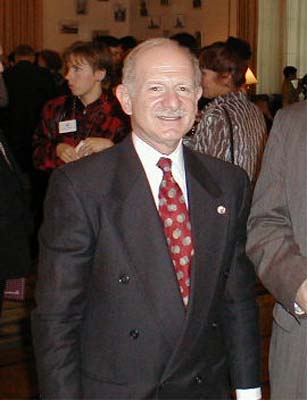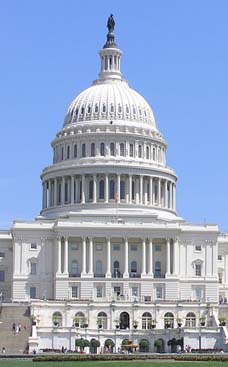
"The expansion in international trade, the unnerving instantaneous, 24-hour movement of capital, and the never-ending news day are realities. The test is whether globalization also can be harnessed to foster greater international solidarity and a greater sense of community among all peoples, whether all people will share in the benefits. I believe Peace Corps volunteers can play a role in answering that question. I believe we can help make globalization "personal" and "local" by bringing the benefits of the information revolution into the hands of the students, the health workers, the campesinos, the women's groups, the indigenous artisans cooperatives, and the teachers with whom volunteers live and work. " Mark Schneider, Senior Vice President of the International Crisis Group in Washington, was the second Returned Peace Corps Volunteer (El Salvador, 1966–68) to head the agency.
Globalization, Information Technology, and the Peace Corps in the 21st Century by Mark Schneider, Director, Peace Corps
Globalization, Information Technology, and the Peace Corps in the 21st Century
Remarks by Mark Schneider, Director, Peace Corps
Woodrow Wilson International Center for Scholars June 7, 2000
Mark Schneider has served as director of the Peace Corps since the end of 1999. He has already been to many of the countries being served by Peace Corps volunteers and has given the organization several new priorities, including and especially dealing with the AIDS epidemic in Africa and bringing information technology to the poorest nations.
Mr. Schneider was himself a Peace Corps volunteer from 1966 to 1968, assigned to work on community development projects in San Salvador.
I am delighted to be here to give you an update on the Peace Corps and how the men and women who serve as Peace Corps volunteers are helping people meet the 21st century development challenges.
When President Kennedy established the Peace Corps by Executive Order on March 1, l961, he said, "We have, in this country, an immense reservoir of . . . men and women anxious to sacrifice their energies and time and toil to the cause of world peace and human progress."
Today, nearly forty years later, the Peace Corps has nearly 7,000 volunteers who maintain that same spirit of service and idealism working in seventy-seven countries around the world. Peace Corps volunteers are serving as teachers in Africa, Eastern Europe, Central Asia, and the Pacific Islands. They are helping farmers in Latin America learn about -- and benefit from -- sustainable agricultural practices. Peace Corps volunteers are working with women to obtain small loans from village banks to start their own businesses. And they are helping local health care workers promote health and nutrition in their communities.
At the same time, Peace Corps volunteers are making an enormous contribution to how the people of many developing nations see and think about America. I think the former American ambassador to Guinea put it best when he wrote the following cable to the State Department two years ago. "When I presented my credentials to President Conte," Ambassador Tibor Nagy wrote, "my prepared remarks included a brief mention of all USG activities in Guinea. In his extemporaneous response, Conte launched into spirited and effusive praise for Peace Corps volunteers and their work in Guinea." The ambassador said that for many people in Africa, "Peace Corps volunteers are the real American ambassadors, not whoever runs the embassy in the capital . . . The fact is that most people on this continent form their opinions about America and Americans from their exposure to volunteers."
I have had similar experiences. On my recent trip to West Africa, I was somewhat taken aback by the frequency with which prime ministers, cabinet ministers, and even the Vice President of Ghana asked me if I knew a particular volunteer who had taught them English or math or had lived in their village one or two decades earlier. The success of the Peace Corps in conveying who we are as a people was expressed in the comments of these leaders and of the local teachers, farmers, and micro-entrepreneurs I met.
Indeed, the best part of my job is the opportunity I have to visit with volunteers and their counterparts and neighbors at their sites. And believe me, it is an inspiration to see the ingenuity, creativity, and innovation that today's volunteers are bringing to their jobs, as well as the lasting impact they have on the lives of other people.
Since January, I have visited volunteers in nine countries in Central America, Central Asia, West Africa, and Eastern Europe. I have to admit that the first trip to Central America also permitted me to visit the barrio in El Salvador, where my wife, Susan, and I served together as Peace Corps volunteers. Volunteers now are helping El Salvador turn an eight-year-old peace accord into a new national future. It was a very moving experience to go back to that community and see some of the people who had influenced our lives. Much had changed in our barrio over the last thirty-two years, but the small bridge that we helped the community build across a ravine was still there, and a new generation of children now cross it every day to reach their school. As the Peace Corps approaches its fortieth anniversary, our volunteers are finding solutions to contemporary problems that can accelerate the pace of development.
For instance, volunteers are serving in the new republics of the former Soviet Union, where they are teaching business principles and helping entrepreneurs and small businesses make the difficult transition from state-run economies to those based on free market principles. And they are working with local governments, which are so crucial to the democratic experience. Peace Corps volunteers are working with communities in dozens of countries to protect biodiversity at the local level so that future generations can experience sustainable economic growth. In Honduras, they are helping local governments and communities develop plans and systems to mitigate the tragic effects that natural disasters, such as Hurricane Mitch, have on the country's development. And in Africa, they are collaborating with USAID, international agencies, grassroots organizations, schools, and health groups to help eradicate polio and prevent the spread of HIV/AIDS, which is not only undermining national development, but is also, in my view, the dominant humanitarian challenge confronting the world today.
These are some of the areas we are targeting today as ways to accelerate development. But as we enter the 21st century, there is an even broader challenge that developing countries face, and one that Peace Corps volunteers are uniquely positioned to help them address. The challenge is globalization, an issue that is now at the center of the debate about how the "new economy" affects people in the poorest countries.
The expansion in international trade, the unnerving instantaneous, 24-hour movement of capital, and the never-ending news day are realities. The test is whether globalization also can be harnessed to foster greater international solidarity and a greater sense of community among all peoples, whether all people will share in the benefits. I believe Peace Corps volunteers can play a role in answering that question. I believe we can help make globalization "personal" and "local" by bringing the benefits of the information revolution into the hands of the students, the health workers, the campesinos, the women's groups, the indigenous artisans cooperatives, and the teachers with whom volunteers live and work.
Moises Naim, the editor of Foreign Policy, recently wrote, "The l990s began in Berlin and ended in Seattle" where a crowd sought "to rebuild walls that might shield them from the ills unleashed by 'globalization.'" On the one hand, to explain the attack on globalization, Naim pointed to some of the ways that economic reforms had failed to achieve all of their objectives. He cited the ten emerging economies that endured financial crises in the l990s, the flight of capital and jobs, and the evidence of increasing inequity and unremitting poverty that force three billion people to live on two dollars per day.
On the other hand, Naim also noted the progress that has occurred in parallel with the increasing integration and globalization of the world's economies, such as the expansion of world trade, a sharp reduction in the hyper-inflation that plagued many countries in the 1980s, a booming U.S. economy, lower tariffs on industrial goods, and the ability of those same emerging economies to recover more quickly from financial crises than ever before.
But while we can debate the pros and cons of globalization, I believe that there is a consensus on one key point. Virtually every current international development expert, from the most conservative member of the IMF to the most liberal NGO, agrees that current levels of inequity and poverty in the developing world are unacceptable.
The World Bank Development Report this year found that the richest third of countries achieved about a 50 percent increase in their per capita GDP from l970 to l995; but the per capita GDP of those in the poorest third showed virtually no increase. Even though we can point to important gains in social conditions, too many people in too many countries still live in extreme poverty.
There is now broad agreement that more and better human capital investment, such as devoting more resources to quality education for girls as well as boys and improving access to primary health care, are vital to achieve sustainable levels of economic growth.
Experts on both sides of the debate, I am pleased to note, increasingly are calling on governments to be more accountable and democratic, to manage natural resources in ways that protect our children's economic future, and to give the poor greater access to credit for micro and small businesses, infrastructure, title to property, and legal protection.
One reflection of the new policy consensus are the conclusions of the 2000 World Development Report that after fifty years of development experience, the four key lessons learned are: "First, macroeconomic stability is an essential prerequisite for achieving the growth needed for development. Second, growth does not trickle down; development must address human needs directly." Here, let me add that this is a fundamental and crucial change from the diagnosis at the outset of the 90's. "Third, no one policy will trigger development. Fourth, institutions matter; sustained development should be rooted in processes that are socially inclusive and responsive to changing circumstances." Again, this recognition of the key role of government particularly with respect to local government and the rule of law, constitute welcome additions to the previous prescriptions for economic development.
Moreover, it is not just the experts who are concerned about the effects of globalization on the world's poorest people. The Program on International Policy Attitudes at the University of Maryland just released a study on how ordinary Americans view the complexities of globalization, and it contains some very interesting conclusions. Let me quote just one point. "Most Americans," the study said, "perceive poor countries as not getting a net benefit from international trade, and they support giving preferential trade treatment to poor countries. Very strong majorities believe that the U.S. has a moral obligation to promote development in poor countries and that doing so ultimately would serve US economic interests."
Recognizing the importance of poverty reduction and enhancing equity, however, is one thing, changing policies, offering incentives, transferring resources and knowledge is another.
The growing consensus of the need for those changes is a major step forward. That consensus plays to Peace Corps' strengths. Peace Corps traditionally has worked at the local level helping communities satisfy human needs, strengthening grassroots institutions, and transferring the skills and knowledge for sustainable development.
In the 21st century, I am convinced that Peace Corps is even better prepared and better positioned than virtually any other agency or institution to bring information technology to the task of poverty reduction. To be sure, technology is no panacea -- it will not solve all of the problems that confront people in the developing world. Yet if the poor are unable to participate in the information technology revolution that we now take for granted, the equity gap will widen even further.
It is within this context of coping with the reality of globalization that Peace Corps is launching its own 21st century e-initiative. The World Bank, USAID, the UN, and others are teaming up with the information giants in an ambitious effort to create the information technology portals through which connections can be made to the world of e-commerce, e-knowledge, and e-systems. I believe that Peace Corps volunteers can carry the information revolution right through those portals and far beyond. Let me explain how.
Virtually every Peace Corps volunteer sworn in today is adept at using computers, integrating information technology, and accessing the Internet. In many respects, they are comparative experts when they arrive in their overseas communities. There may be 50 million Web sites, but most of the people in the developing world have never made a telephone call, much less sat in front of a computer and surfed the Internet.
Volunteers can change that. They can turn the traditional pattern of the poor getting technology last, upside down.
Let me give some examples of what our volunteers are doing right now. In Ghana, I met a young man from Seattle, who thought he was going to teach math at a high school in the capital city of Accra. The school director, however, asked him if he knew what could be done with fifteen computers that had arrived but seemed not to work. He suddenly became the director of the school's computer literacy program. For a year, he was the only teacher who taught computer operations to 1,500 students and their teachers.
In Bulgaria, I met one volunteer who helped her counterpart grassroots group acquire three computers, a modem, and a printer. Today, they are operating the computer-learning center for a host of non-governmental organizations, cooperatives and small businesses.
In Central America, I met an outstanding senior volunteer, who had spent 40 years as a marketing executive at the Goodyear tire company. He served two years as a business volunteer in Ukraine. Today, he is in his second tour and serving as a business volunteer in Guatemala, where he is working with a small company that helps Mayan women's cooperatives, in the former conflict zone, expand their markets and improve their products. He taught them how to create a Web page that now is advertising their traditional fabrics in the e-commerce marketplace.
And in the remote reaches of Kenya, a Peace Corps volunteer who is serving as a science teacher had a laptop but no electricity. So, in a classic example of Peace Corps ingenuity, he rigged some discarded solar panels to power his laptop. He was able to connect to the Internet and draw down the information he needed to improve the work plans for his fellow teachers.
These are just several examples of how volunteers are using technology to help their communities develop and prosper. These volunteers are smarter and certainly more computer savvy than I was when I was a volunteer. But we can do even more to assist Peace Corps volunteers in transferring the extraordinary skills they possess in information technology. The transfer of knowledge must be sustainable. It must be part of a project owned by the local community. And it must be a tool that does not separate the volunteer from the community but, instead, offers the community a window to the world's bounty of knowledge. We have launched the Peace Corps e-initiative to expand the role that our volunteers play in bringing the power of information technology to the task of poverty reduction. The key elements are the following:
1.We will build upon Peace Corps' traditional strengths of local community presence, intimate knowledge of local customs and language, and demonstrated success at grassroots project development and execution. We will enable technology projects that are financed by other organizations to become accessible to students and businesses that are not in the main square of capital cities, but beyond the end of the road in distant villages. We also are proposing to harness IT to help resource-poor communities advance their development goals in education, health, environmental protection, agriculture production and small business enterprises, and municipal development. We want volunteers to prepare projects to do just that.
2.To recruit Peace Corps volunteers with IT skills, a month ago we created a new category for Information Technology generalists and specialists. It will give computer whizzes a place to identify their skills for the first time. This also helps our overseas offices more clearly identify where and how PCVs with these skills can work in the myriad of projects out there, and specifically request them. For instance, Belize now is requesting thirty IT volunteers to lead their effort to bring computers into every primary school by 2005. The first ten volunteers arrived yesterday and twenty more are being recruited.
3.We are undertaking a massive "training of trainers" process for volunteers who are comparative experts in using information technology but not necessarily in teaching others how to use it. We also want to expand the training programs to insure that volunteers and their counterparts become proficient in information technology teaching techniques.
4.We want to see community computer literacy centers, micro and small business web page design centers; school-based learning centers expanded by volunteers around the world. We can point to dozens of innovative uses by volunteers who have done it without support. Now we want to find ways to offer support and believe the numbers of those projects will be multiplied ten-fold. Today, I would like to challenge America's information giants to join the Peace Corps' e-initiative by contributing funds, hardware, software, and teaching modules to a Peace Corps e-Partnership Fund. The Fund will permit us to support hundreds of new volunteer information technology projects developed at the grassroots with community, NGO, small business, and local government partners.
Thirty years ago, my wife and I worked with our neighbors to build a bridge across a gully so that students could reach school safely. Today, this new Peace Corps e-initiative will enable volunteers to help build bridges across the digital divide to connect people in the poorest communities to the world of learning and, hopefully, to more promising futures.
In that way, we can make globalization "personal" and "local" and begin to give those who traditionally have been left on the margins of technology a link to the center of the information revolution.
Woodrow Wilson once said, "There is no cause half so sacred as the cause of a people, there is no idea so uplifting as the idea of service to humanity." The Peace Corps continues to embody those values, and I am very proud and honored to be leading the agency at this time in its history.


















